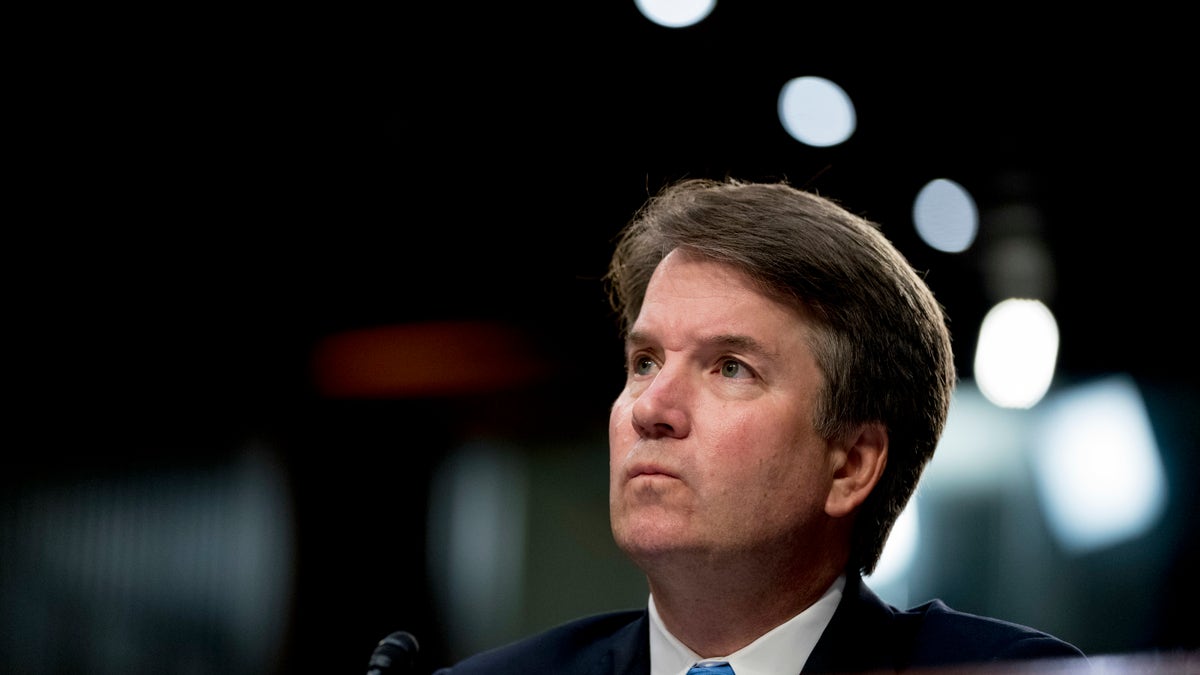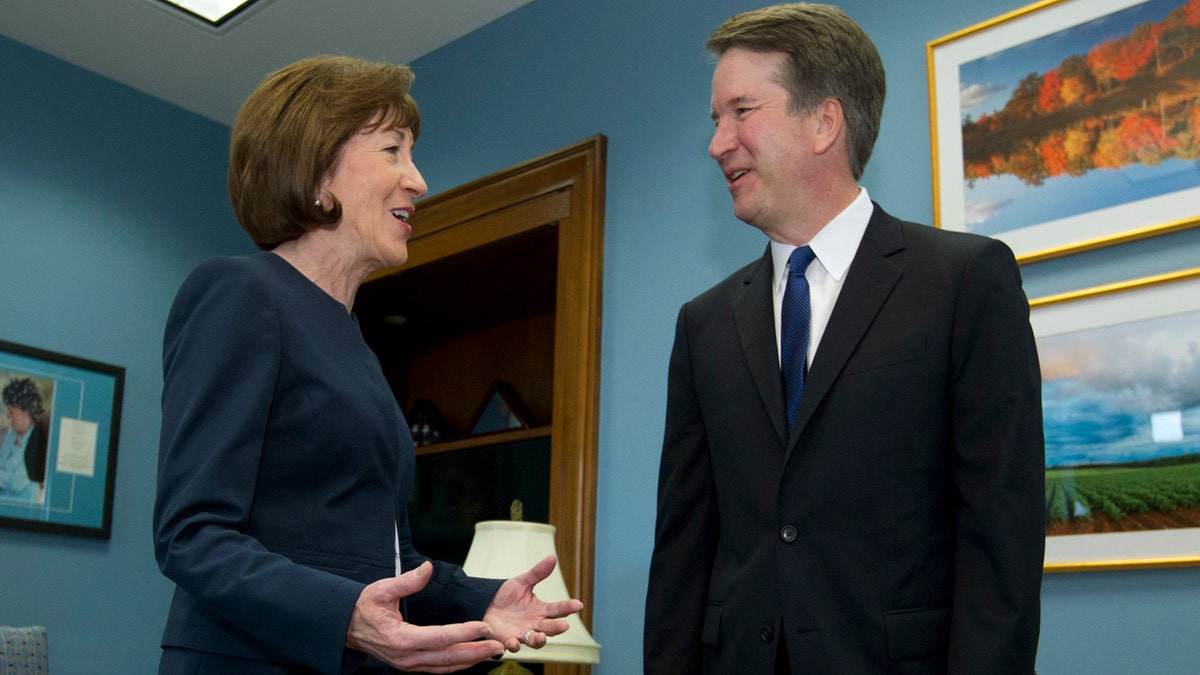
FILE - In this Sept. 5, 2018, file photo, then Supreme Court nominee Judge Brett Kavanaugh pauses while testifying before the Senate Judiciary Committee on Capitol Hill in Washington. Kavanaugh's confirmation is a flashpoint for the November midterms. (AP Photo/Andrew Harnik, File)
Supreme Court Justice Brett Kavanaugh has been weaponized, just in time for the midterm elections.
Up until his confirmation vote, an influx of political ads targeting vulnerable senators took voters’ screens by storm. From Facebook to traditional TV ads, dark-money groups ramped up the rhetoric around Justice Kavanaugh in an attempt to shame lawmakers and influence their votes one way or the other.
Now, with less than a month before most states’ midterm elections, some of the same groups are trying to use Justice Kavanaugh’s appointment as a wedge issue to divide voters. Like any October surprise, the question is whether the controversy surrounding Kavanaugh will carry through the midterm election and upend any expected results.
“An issue or controversy piques the interests of voters, and then often fades before election day,” Larry Sabato, director of the University of Virginia’s Center for Politics, said. “So much happens every day. Partly it depends on what the candidates stress, and the party leaders and elected officials choose to emphasize in TV ads and at rallies.”
Kavanaugh served as a judge on the U.S. Court of Appeals for the D.C. Circuit for 12 years and has been criticized as being overly partisan during past confirmations. Over his career, Kavanaugh built a solidly conservative judicial philosophy that echoed the late Justice Antonin Scalia.
His confirmation process turned contentious when allegations of a drunken teenaged sexual assault came to light. The investigation into his past dredged up questions about his drinking habits. Ultimately, the Senate voted 50-48 to confirm Kavanaugh.
Sen. Lisa Murkowski, R-Alaska, abstained from voting, and was heavily targeted by pre-vote ads in her state. Sen. Joe Manchin, D-WV, was the lone Democrat to confirm Kavanaugh, and similarly drew the focus of deep-pocketed ad campaigns.
“If there has been a partisan political fight that needed a very bright legal foot soldier in the past decade, Brett Kavanaugh was probably there,” Sen. Chuck Schumer, D-NY, said in 2006.
In the weeks before the Senate voted to confirm the embattled judge, partisan advocacy groups dumped money into advertising campaigns meant to sway legislators.
If more Republicans are coming into the election conversation, then they will vote, and that can’t be good news for the Democrats – even the incumbents.
Among those in opposition were the American Civil Liberties Union, which invested in a “seven-figure, multi-state TV ad buy” to oppose the nomination in early October. Demand Justice, a progressive judicial advocacy group, spent $700,000, according to the Washington Post.
NARAL Pro-Choice also pitched in $1 million in direct opposition to Kavanaugh’s nomination, and has plans for a $750,000 voter education campaign in the final days before the midterms.
Progressive organizations certainly dipped into their pockets to fight President Donald Trump’s second nominee to the Supreme Court, but their effort were far overshadowed by their conservative counterparts.
The National Rifle Association ponied up $1.2 million to launch ads supporting the judge in West Virginia, Indiana, North Dakota, Alaska and Montana, according to the Brennan Center for Justice.
The Judicial Crisis Network, a right-wing nonprofit advocacy group, spent $12 million on ads supporting the controversial justice’s confirmation. They specifically targeted senators in West Virginia, North Dakota, Alabama and Indiana – all of whom are up for re-election.
To put this in context, the Center for Responsive Politics reported that a winning Senate campaign cost $12.2 million dollars on average.
JCN, like all the groups listed above, is a 501(c)(4) organization, which means they have no obligation to disclose their donors. However, the Center for Responsive Politics reported that tax returns show the JCN is largely supported by the Wellspring Committee, another nonprofit conservative advocacy group.
From 2011 to 2015, the Center for Responsive Politics reported the Judicial Crisis Network received about $17.3 million in revenue, about $15 million of which came from the Wellspring Committee.
This isn’t the first time JCN has acted aggressively to sway voting on a nominee to the Supreme Court. They reportedly spent $7 million in opposition to former President Barack Obama’s nomination of Merrick Garland, and another $10 million in support of Justice Neil Gorsuch.
Carry Severino, policy director for JCN, said the organization opposed Garland because his nomination came during an election cycle when America was deeply divided. The organization jumped headlong into Kavanaugh's nomination to defend a man she saw as unfairly attacked.
"We have a policy of always being ready," Severino said. "... I couldn't have a nominee I'm more proud of supporting than Brett Kavanaugh."
Partisan groups, like Demand Justice and JCN, mostly targeted vulnerable senators facing upstart challenges in their races for reelection.
“The Senate matters enormously, and as it happens, most of the key race are in deeply red states,” Sabato said. “If more Republicans are coming into the election conversation, then they will vote, and that can’t be good news for the Democrats – even the incumbents.”
The reelection rate for incumbent senators is about 93 percent, according to the Center for Responsive Politics.
There wasn’t an issue in 2012 that energized Republicans like this. Voters overwhelmingly supported Justice Kavanaugh throughout this entire confirmation process.
Among those hit hardest for their vote against Kavanaugh is Sen. Heidi Heitkamp, D-ND, who is facing an uphill battle for reelection against Kevin Cramer. A recent Fox News poll has Cramer leading the incumbent by 12 points.
A spokesman for the North Dakota Republican Party said Republican voters are “fired up” over her opposition to Kavanaugh.
“She’s never faced a deficit like this,” Jake Wilkins, communications director for the North Dakota Republican Party, said. “There wasn’t an issue in 2012 that energized Republicans like this. Voters overwhelmingly supported Justice Kavanaugh throughout this entire confirmation process.”
Heitkamp broke with the majority of Democrats and voted to confirm Justice Neil Gorsuch, a move that drew criticism from some who wanted her to vote along party lines.
“I voted for Justice Gorsuch because I felt his legal ability and temperament qualified him to serve on the Supreme Court. Judge Kavanaugh is different,” Heitkamp said in a statement. “… In addition to the concerns about his past conduct, last Thursday’s hearing called into question Judge Kavanaugh’s current temperament, honesty, and impartiality.”
Sen. Susan Collins, R-ME, has been both criticized and lauded for her vote of approval. The Judicial Crisis Network focused intently on influencing the senator with ads in Maine, and spent six figures thanking the Republican Collins for her vote.
Voters in Maine will also see an ad paid for by Protect Our Care, a group supportive of the Affordable Care Act, that hits Sen. Collins for her decision to support the controversial nominee. The group argues that Kavanaugh will be the deciding vote against the healthcare law if the Supreme Court hears a case challenging it.
According to the Brennan Center for Justice, the State Government Leadership Fund spent over $500,000 to push Collins to approve Kavanaugh. The Vote Vets Action Fund and the Planned Parent Action Fund poured $160,00 and $250,000 into ads pushing for her disapproval, respectively.

Sen. Susan Collins, R-Maine, speaks with Supreme Court nominee Judge Brett Kavanaugh at her office, before a private meeting on Capitol Hill in Washington, Aug. 21, 2018. (Associated Press)
Another senator targeted heavily before Kavanaugh’s confirmation hearing was Joe Donnelly,D-IN, who is facing a surging Republican challenger in his reelection race. The most recent Fox News poll had Donnelly leading Mike Braun by two percentage points.
Donnelly voted to confirm Gorsuch and against Kavanaugh, decisions that Democratic party officials in Indiana don’t think will come back to haunt him.
“[Voters] are fired up to re-elect Joe Donnelly because they know he’s the only candidate working to protect access to affordable healthcare and defend coverage for Hoosiers with pre-existing conditions,” Michael Feldman, spokesman for the Indiana Democratic party, said.
Indeed, if campaign contributions spell voter enthusiasm, then Donnelly is in good shape. His campaign reported 30,000 individual donations during the third quarter alone, netting the incumbent more than $3 million. That’s a high-water mark for his campaign.
Only time will tell if Kavanaugh’s confirmation will bleed into the midterm elections.
“It may have already had its major effect – energizing potential voters,” Sabato said. “Republicans talk about a ‘Kavanaugh bump’ that has energized some of their base that wasn’t planning to vote. That could well be true. Of course, Democrats say the same thing, except the enthusiasm gap favored Democrats and now Republicans have caught up.”












































